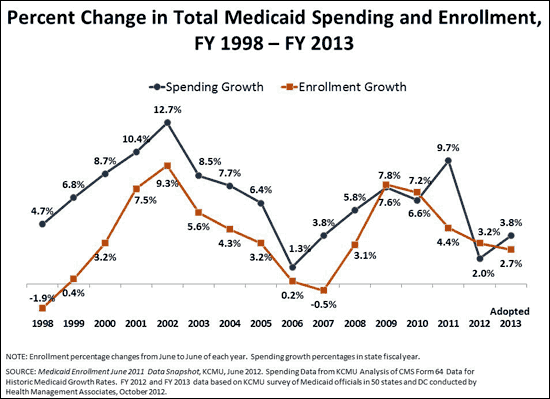

The independent source for health policy research, polling, and news.
Total Medicaid Spending and Enrollment Growth Slowed Significantly in FY 2012 Amid Signs of Economic Recovery and States’ Efforts To Curb Costs
Washington, D.C. – Growth in total Medicaid spending and enrollment slowed substantially in state fiscal year 2012 as the economy began to improve and states continued to work to control costs. Relatively slow spending and enrollment growth are expected to continue in FY 2013, according to the 12th annual 50-state Medicaid budget survey by the Kaiser Family Foundation’s Commission on Medicaid and the Uninsured, conducted with Health Management Associates.
Total Medicaid spending increased 2 percent on average across all states in FY 2012, down from 9.7 percent in FY 2011 and among the lowest rates of spending growth ever recorded (in 2006, spending grew by 1.3 percent). A slowly improving economy helped to moderate growth in Medicaid enrollment, which grew at an average 3.2 percent rate across states, down from 4.4 percent a year earlier. State responses to the increase in the state share of Medicaid spending with the end of enhanced federal funding through the American Recovery and Reinvestment Act (ARRA) in June 2011 likely contributed to the spending slowdown as states stepped up cost control efforts.
 “After several economically depressed years in which high demand for public programs and slumping tax revenue created intense pressure on state Medicaid programs, last year saw total Medicaid spending growth hit a near record low,” said Diane Rowland, Executive Vice President of the Kaiser Family Foundation and Executive Director of the Foundation’s Commission on Medicaid and the Uninsured. “Reining in costs remains the dominant theme, but the improving economy has offered states more leeway to move forward on delivery system reforms and implementation of the Affordable Care Act.”
“After several economically depressed years in which high demand for public programs and slumping tax revenue created intense pressure on state Medicaid programs, last year saw total Medicaid spending growth hit a near record low,” said Diane Rowland, Executive Vice President of the Kaiser Family Foundation and Executive Director of the Foundation’s Commission on Medicaid and the Uninsured. “Reining in costs remains the dominant theme, but the improving economy has offered states more leeway to move forward on delivery system reforms and implementation of the Affordable Care Act.”
For FY 2013, states expect Medicaid enrollment to grow at an even slower rate than this year, 2.7 percent on average, the survey finds. Legislatures have authorized total Medicaid spending growth, including both state and federal shares, of 3.8 percent on average across states for FY 2013. While higher than this year, that would still represent one of the lowest rates of growth in Medicaid spending. State-only Medicaid spending is expected to grow by 2.3 percent in FY 2013, slower than total Medicaid spending growth, and much more slowly than in FY 2012, when states confronted the end of the enhanced federal funds under ARRA.
Other key survey findings include:
- Curbing costs remains a strong focus. In FY 2012, 48 states implemented at least one new policy to control Medicaid costs, and 47 planned to do so in FY 2013. Provider rate restrictions were the most commonly reported cost containment strategy. However, with some improvement in the economy, some states were able to restore cuts or make targeted efforts in FY 2013 to boost provider rates and benefits. States also continue to expand community-based long term care through both traditional programs and also new options in the Affordable Care Act (ACA).
- Medicaid programs are engaged in a range of delivery system changes. Twenty states reported expanding their use of managed care in FY 2012, and over two-thirds of states plan to do so in FY 2013. In addition to managed care, states are moving ahead with care coordination strategies for persons with chronic conditions, including those dually eligible for Medicare and Medicaid, using health homes, patient-centered medical homes and other ways to improve care and outcomes.
- States continue to move ahead with efforts to implement the ACA. Nearly every state is in the process of upgrading eligibility systems. States are also making decisions about what type of Health Insurance Exchange will operate in their state as well as how to proceed with the Medicaid expansion. The recent Supreme Court decision effectively made the ACA’s Medicaid expansion optional for states, and for many states decisions about the expansion will hinge on the outcome of the elections in November as well as evaluations of the fiscal, political and health coverage impact of undertaking the expansion. States will also be watching to see if debate about federal deficit reduction results in reductions in federal financing or major structural changes to Medicaid.
The new survey, Medicaid Today; Preparing for Tomorrow: A Look at State Medicaid Program Spending, Enrollment and Policy Trends: Results from a 50-State Medicaid Budget Survey for State Fiscal Years 2012 and 2013, is available online.
The Kaiser Family Foundation, a leader in health policy analysis, health journalism and communication, is dedicated to filling the need for trusted, independent information on the major health issues facing our nation and its people. The Foundation is a non-profit private operating foundation, based in Menlo Park, California.The Kaiser Commission on Medicaid and the Uninsured provides information and analysis on health care coverage and access for the low-income population, with a special focus on Medicaid’s role and coverage of the uninsured. Begun in 1991 and based in the Kaiser Family Foundation’s Washington, D.C. office, the Commission is the largest operating program of the Foundation. The Commission’s work is conducted by Foundation staff under the guidance of a bipartisan group of national leaders and experts in health care and public policy.
